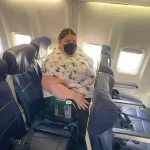Airlines required to refund passengers for canceled, delayed flights
The post Airlines required to refund passengers for canceled, delayed flights appeared first on Healthy Holistic Living.
In a bold move set to reshape the air travel experience, the U.S. Department of Transportation has rolled out new regulations that could spell the end of the long-standing headache over flight disruptions for millions of travelers. With a firm directive now in place, airlines face a mandate that could not only ease the financial strain on passengers but also pave the way for more transparent dealings. This initiative promises to inject fairness into a process that, until now, often left consumers in the lurch. As we delve into the specifics of these new rules, passengers and consumer advocates alike may finally see a silver lining when flights don’t go as planned. Intrigued? Read on to discover how these changes might benefit you on your next trip.
New Refund Rules Explained
In an effort to make air travel more consumer-friendly, the U.S. Department of Transportation (DOT) has implemented new regulations ensuring that passengers receive timely refunds for canceled or significantly delayed flights. These rules mark a pivotal shift toward holding airlines accountable for disruptions that impact passengers’ travel plans.
Refund Eligibility and Timeframes
Under the new regulations, airlines are mandated to issue full refunds to passengers if a flight is canceled or faces significant delays. The definition of a “significant delay” varies by airline but generally aligns with a delay of three hours or more for domestic flights and six hours or more for international flights. This policy also covers ancillary services that passengers could not use due to these disruptions, such as checked bags, advance seat selection, and in-flight Wi-Fi.
Airlines must process refunds within seven business days if the purchase was made by credit card and within twenty business days for other forms of payment, such as cash or check. This prompt refund initiative is part of a broader push by the DOT to enhance transparency and reduce the financial burden on travelers caused by airline disruptions.
Scope of Coverage
The rules extend beyond just the ticket costs. They also mandate refunds for any ancillary fees paid for services that were not provided due to the cancellation or delay. For example, if a passenger pays for a checked bag or selects a premium seat, and these services are not available due to flight changes, they are entitled to a refund for those specific fees.
These regulations stem from a broader initiative by the U.S. government to enhance consumer protections in the airline industry, reflecting ongoing efforts to ensure that passengers are not financially penalized for changes in their travel plans beyond their control.
The impact of these new rules is significant, offering a clearer and more straightforward path for travelers seeking refunds, thus ensuring a more transparent and fair travel experience. These changes are a direct response to the substantial number of complaints and inquiries from passengers who faced hurdles in receiving due refunds, prompting the DOT to take decisive action to protect consumer interests.
For more details on the specific rules and guidance regarding airline refunds, visit the U.S. Department of Transportation’s website and the Ticket Refunds section.
Consumer Savings and Benefits
The U.S. Department of Transportation’s (DOT) updated regulations bring significant financial relief and protections to airline passengers, aiming to enhance transparency and accountability in the airline industry. These changes, particularly in how refunds are processed for cancellations and significant delays, are projected to save consumers a substantial amount of money annually, as well as reduce the frustration and inconvenience typically associated with such travel disruptions.
The DOT’s initiative compels airlines to issue timely refunds directly back to the original form of payment, a move that contrasts sharply with previous practices where passengers often received travel vouchers or credits, which could have restrictions and expiration dates. This shift not only streamlines the refund process but also ensures that refunds are more equitable, particularly benefiting those who might not travel frequently.
Moreover, the regulations extend beyond mere ticket refunds. They include compensations for any ancillary services paid for but not received, such as checked baggage fees, advanced seat selections, and in-flight Wi-Fi. This comprehensive approach to refunds acknowledges the myriad ways consumers spend money on air travel and ensures they get their money’s worth, or their money back, if services are not rendered as expected.
These regulatory enhancements are backed by substantial penalties for non-compliance, signaling a robust enforcement approach by the DOT. For instance, recent actions have seen airlines paying fines totaling millions of dollars for not adhering to refund policies, underscoring the government’s commitment to safeguarding consumer interests.
The overarching aim of these policies is not just to reimburse passengers but to drive a broader change within the airline industry. By holding airlines accountable for timely refunds and transparent pricing, the DOT aims to cultivate a more consumer-friendly environment in air travel. This environment should encourage airlines to improve their operational efficiency and customer service, ultimately leading to fewer cancellaries and delays, better communication with passengers, and clearer pricing.
These regulatory changes are a win for consumer rights and reflect a significant advancement in airline passenger protections, promising a future where air travel is not only more reliable but also more respectful of passenger rights.
Support from Consumer Advocacy Groups
The new refund regulations implemented by the U.S. Department of Transportation (DOT) have garnered significant support from consumer advocacy groups, who view these changes as major victories for passenger rights. These groups, having long championed the need for more robust consumer protections in the airline industry, played a crucial role in the enactment of these regulations. Their advocacy has helped highlight the issues passengers face and has been instrumental in pushing for reforms that address these challenges directly.
Irene Leech, president of the Virginia Citizens Consumer Council, has been particularly vocal about the need for such reforms. She has praised the DOT for taking decisive action to rectify a system that, until now, often placed consumers at a disadvantage. Her perspective underscores the sentiment that the new rules are not just regulatory changes but corrective measures to restore fairness in airline consumer relations.
John Breyault, Vice President of public policy, telecommunications, and fraud at the National Consumers League, also expressed approval of the new rules. He noted that these changes were long overdue and that they would substantially ease the burden on consumers who previously had to navigate complex and often frustrating processes to obtain refunds. The advocacy by Breyault and his organization highlights a broader consensus among consumer rights groups that the DOT’s actions represent a significant step forward in making airline travel more consumer-friendly.
These groups continue to monitor the implementation of these rules closely, ensuring that they are enforced effectively and that they lead to tangible improvements in airline practices. Their ongoing dialogue with policymakers suggests that this area will continue to evolve, with additional protections likely being introduced as the needs and expectations of air travelers grow.
Moreover, the engagement of these groups often provides a platform for consumers to voice their concerns, ensuring that their experiences directly inform regulatory actions. This collaborative approach between consumer advocacy groups and regulatory bodies like the DOT ensures that the regulations remain relevant and effectively address the real-world challenges faced by passengers.
Overall, the support from consumer advocacy groups underscores a shared commitment to enhancing the transparency and fairness of the airline industry, which is crucial for building trust and satisfaction among travelers. Their continued involvement is essential for sustaining momentum in consumer protection efforts and for ensuring that the interests of passengers are always represented in discussions about air travel policies.
Tips for Air Travelers
Navigating the complexities of air travel can be daunting. Below are essential tips to help you manage your air travel more effectively, especially in light of the new Department of Transportation (DOT) rules:
Navigating Refund Processes
If your flight is canceled or delayed significantly, and you choose not to travel, you may be entitled to a refund. It’s essential to act promptly by requesting the refund in writing from the airline soon after the incident. Airlines have specific timelines to process refunds, typically within seven business days for credit card payments and twenty days for other payment methods.
Avoiding Extra Fees
When booking, always review the airline’s policies on fees for baggage, seat selection, and other optional services to avoid unexpected charges. Low-cost tickets often come with restrictions, including limited options for changes or refunds, which should be considered before purchasing.
Utilizing New Consumer Tools
The Department of Transportation (DOT) offers a consumer dashboard that provides information on what you are owed when flights are canceled or delayed due to an airline’s fault. This tool can be instrumental in understanding your rights and the compensations you might expect.
Advice on Travel Credits and Vouchers
In cases where you’re offered travel vouchers instead of cash refunds, understand the terms associated with these vouchers, such as expiration dates and usage restrictions. Opting for cash refunds, where possible, can provide greater flexibility for future travel plans.
Guidance on Special Circumstances
For those traveling with pets or children, it’s important to check airline policies well in advance. Airlines have specific rules, especially regarding pet travel during extreme weather conditions or providing accommodations for children flying alone. Ensuring you understand these policies can help avoid last-minute surprises and additional costs.
For additional details on your rights and the latest on airline policies, the DOT’s Air Travel Tips page offers extensive information.
Looking Ahead: Potential Future Regulations
The U.S. Department of Transportation (DOT) is actively pursuing new regulations that promise to significantly enhance passenger rights and compensation in the airline industry. A central focus of these initiatives is to eliminate junk fees associated with family seating and to establish mandatory compensation for controllable delays and cancellations.
Ban on Family Seating Junk Fees
Secretary Pete Buttigieg has taken proactive steps by urging Congress to expedite the passage of legislation that would ban junk fees for family seating. This initiative aims to ensure that families can sit together without additional charges, a move that has already led some airlines to commit to fee-free family seating for children 13 or under traveling with an adult. The DOT has launched a family seating dashboard to track and display airline commitments to this policy, providing transparency and aiding consumer decision-making.
Compensation for Delays and Cancellations
Further strengthening consumer protections, the DOT is also proposing rules that would require airlines to compensate passengers for delays and cancellations that are within the airline’s control. This includes compensation in the form of cash, travel credits, or frequent flyer miles, depending on the duration of the delay. Additionally, the proposal includes covering expenses such as meals, hotel accommodations, and rebooking costs when passengers are stranded due to airline-responsible delays.
These proposed changes are designed not only to protect consumers but also to incentivize airlines to improve their service reliability and transparency. By setting clear expectations for compensation and fee transparency, the DOT aims to foster a fairer, more competitive market in air travel, ensuring that passengers’ rights are at the forefront of airline operations.
These initiatives reflect a broader trend towards increased accountability and consumer protection in the airline industry, which could lead to more reliable and consumer-friendly air travel experiences.
Strengthening Consumer Rights: A New Era in Airline Regulations
The recent regulatory changes introduced by the U.S. Department of Transportation represent a significant advancement in consumer protections within the airline industry. These regulations are designed not only to ensure that passengers are compensated for disruptions that are within the control of the airlines but also to make pricing and seating policies more transparent and fair, particularly for families traveling together.
The introduction of stringent refund policies and the proactive steps taken to ban junk fees for family seating demonstrate a strong commitment to improving the air travel experience. With the enforcement of penalties against airlines failing to comply with these new standards, the DOT is setting a new benchmark for airline accountability.
Looking forward, the anticipated regulations on passenger compensation for controllable delays and cancellations are expected to further empower consumers. These measures will likely encourage airlines to optimize their operational efficiencies and enhance overall service quality to avoid financial penalties and maintain customer satisfaction.
These changes, collectively, could transform the landscape of air travel, making it a more consumer-friendly industry. As travelers become more aware of their rights and the standards airlines must meet, we can expect a shift towards more transparent, fair, and enjoyable travel experiences. This ongoing evolution in air travel regulations is a testament to the power of consumer advocacy and government oversight working in tandem to uphold the rights of passengers.
This overview encapsulates the current state and future outlook of airline consumer protections, reflecting a growing trend towards greater transparency and accountability in the airline industry. For further details on the latest regulations and consumer rights, travelers are encouraged to visit the DOT’s official website.
The post Airlines required to refund passengers for canceled, delayed flights appeared first on Healthy Holistic Living.












